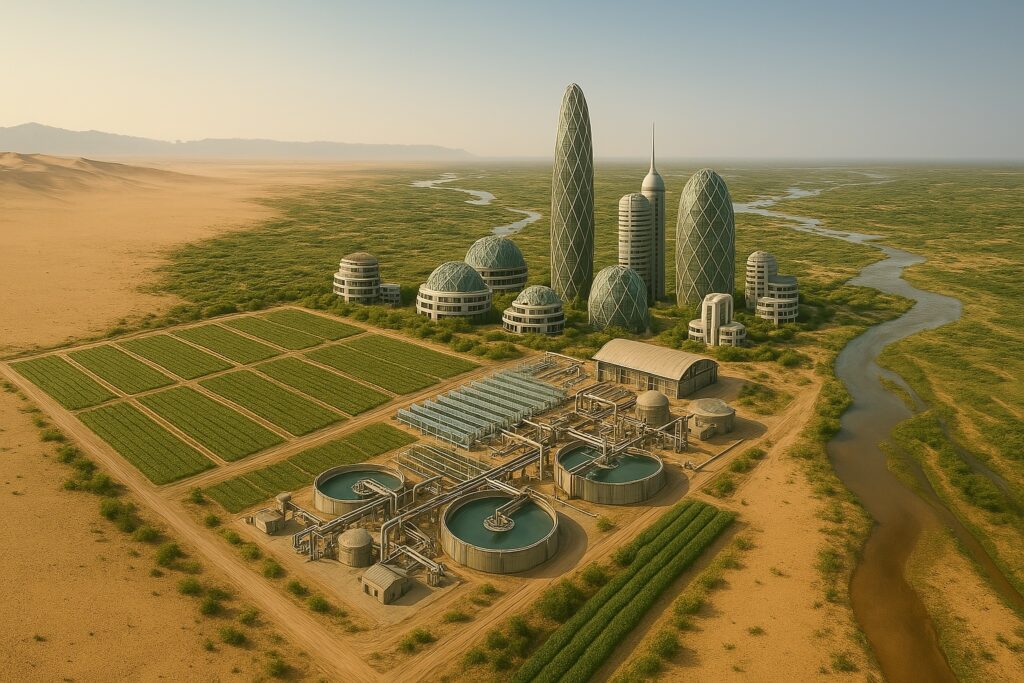By Dr. Andrew Potter, Regenerative Scientist
🌍 The Shift We All Feel
You don’t need a headline to tell you something’s shifting. You’ve felt it—quietly and persistently—in the background of daily life.
The systems we once believed to be solid—water, food, energy, governance—are revealing their fragility. The Mauna Loa curve keeps climbing. Coral reefs bleach and vanish. Glaciers recede like memories. Soils grow tired. Crops become less reliable. And vast landscapes once fertile now drift toward desertification.
These aren’t isolated events. They’re a pattern. A signal—not of apocalypse, but of transition.
This is not a doomsday essay. It’s an invitation to notice what’s changing—and to imagine what we might build in response.
🔄 What Is “Systemic Transition”?
When I say collapse, I don’t mean chaos. I mean the visible unraveling of systems that were never built to last.
What we’re seeing is the slow sunset of industrial paradigms: centralized, extractive, brittle systems that grew in a world where limits felt distant. We’re now facing those limits. And with that reality comes an opening.
We are entering a systemic transition—one where the future will be shaped not by patching the old, but by cultivating what comes next.
But here’s the question we all ask: Whose job is it to lead this?
We’ve spent decades outsourcing that responsibility to institutions and governments. Yet we’ve watched how easily those structures can erode—how even agencies tasked with protection, like the EPA, can be undermined or dismantled.
Many of us were led to believe that small personal choices—recycling, using canvas bags, eating less meat—would be enough. And while these are not meaningless, they are not the lever. Especially when industry, policy, and capital keep pulling in the opposite direction.
In many ways, this is the story of the commons. As Garrett Hardin described in 1968, when shared resources—like air, water, soil—are used for individual gain without shared stewardship, they’re often depleted or destroyed. We’ve treated the atmosphere, the aquifer, the watershed like they belonged to no one. But this isn’t inevitable. Later work, especially by Elinor Ostrom, showed us that commons can be protected—when communities create regenerative, decentralized systems rooted in transparency, accountability, and reciprocity.
That’s where algae come in. These organisms don’t just survive—they optimize, recycle, and regenerate. They offer a model for how life can flourish through interdependence, not exploitation. And if we partner with them wisely, they may help us reimagine how we manage what we all depend on—together.
The real shift now is not just technological. It’s a shift in agency.
The transition belongs to those willing to imagine, design, and live like the next world matters.
🧬 Why Algae?
Algae are not the future. They are the original blueprint of planetary health.
Cyanobacteria—humble ancestors of today’s algae—reshaped the Earth’s atmosphere 2.4 billion years ago, oxygenating the planet and laying the foundation for all plant life to come. Without them, agriculture never happens. Civilization never rises. The pyramids are never built. AI is never trained.
We owe our existence to these microbes. And in many ways, they are still teaching us how to live.
Algae are:
- Decentralized
- Resilient
- Scalable
- Symbiotic
- Ancient and futuristic
They don’t just survive harsh conditions—they optimize in them. They clean water, sequester carbon, and produce food, fuel, and healing compounds. Their metabolism responds to their environment with breathtaking efficiency, offering us a window into how to design adaptable systems for an uncertain world.
In fact, algae’s contextual intelligence—its ability to shift biochemical activity based on environmental cues—is an untapped engine of biotech potential. If we can understand and partner with this intelligence, we can begin to pull levers of design we haven’t even imagined yet.
The time of algae has come. Again.
🛠️ What I’m Building
My work is not about marketing green products or riding a trend.
It’s about participating in the re-architecture of life.
At Algae Aura, I’ve developed skincare formulations based on phycocyanin—a brilliant blue antioxidant extracted from spirulina. Each serum is rooted in years of algae cultivation science and reflects a belief that beauty and biochemistry can coexist sustainably.
At Algae Analytics, I work with communities and clients to design algae-based systems that address real-world challenges—like wastewater treatment, carbon drawdown, and climate resilience.
These aren’t pipe dreams. These are living systems, built from the traits algae already possess: adaptability, productivity, and interdependence.
Long-term, I see this work funding the prototyping of decentralized, regenerative infrastructure—systems that use bioprospecting and strain selection to match algae’s diversity to the demands of specific environmental contexts.
Whether for carbon capture, nutrient recovery, oil production, or active compounds, algae offer a design palette unlike anything else in biology.
🧭 How You Can Join the Transition
This work isn’t just for biologists or engineers.
We need artists, parents, city planners, architects, investors, teachers.
We need people who are ready to stop tweaking the old system and start building the new one—people who are ready to live in a way that reflects what matters next.
I’m here to collaborate—with those designing solutions, telling stories, developing products, or reimagining systems that last.
✨ Closing
If the world as we know it is dissolving, that doesn’t mean the future is lost.
It means we are being invited—urgently but gracefully—to participate in something deeper:
The re-invention of home.
The regeneration of systems.
The remembering of our place in the web of life.
And the blueprint, it turns out, might be microscopic, blue-green, and older than time.
🔗 Let’s Collaborate
Ready to build the next economy together? I’m actively partnering with communities, companies, and creatives focused on sustainability, systems design, and biotech innovation.
- 🔬 [Algae Analytics] – Consulting for climate-adaptive, algae-based systems
- 🧪 [Algae Aura] – Regenerative skincare, rooted in science and sustainability





